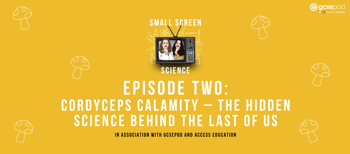
The podcast episode examines several scientific threads, including the biology of fungi and how they differ from plants and animals, the real-life behaviour-manipulating fungus (Ophiocordyceps unilateralis) that inspired the game creators, and the genuine threats posed by fungal infections in our warming world. Karen and Emma also delve into the psychology of gaming, including the different types of gamers and the concept of "game dadification" that underpins Joel and Ellie's relationship.
Want to know if you could survive a fungal apocalypse? According to a 2024 YouGov poll discussed in the episode, only 32% of adults think they would do well, while 25% believe they would fare very badly!
Watch…
Spotify: https://open.spotify.com/show/7ka0hbd2EX0ZjvFBqnBDMU
Apple: https://podcasts.apple.com/gb/podcast/small-screen-science/id1511181067
Fun Fact
Did you know that the largest organism in the world is actually a fungus? A species of honey fungus (Armillaria ostoyae) discovered in 1998 covers roughly 2,384 acres of Oregon Forest. This massive fungal network has survived for over 2,400 years! While the mushrooms (fruiting bodies) we see above ground make up only a tiny part of the fungus, the rest lives underground as an extensive network of threads (hyphae) that form the mycelium. This puts the blue whale – often thought to be the world's largest organism – to shame!
(Listener Challenge)
We're fascinated by the fungal world and its relationship to human history!
Your challenge: Research Ötzi the Iceman and discover why he was carrying two species of fungi when he died over 5,000 years ago. What medicinal properties might these fungi have had? How might this ancient discovery relate to modern fungal medicine? Does this change your perspective on how fungi are portrayed as villains in "The Last of Us"?
Access GCSEPod Science Resources
Classroom Corner
Want to use this episode in your classroom? Here are some discussion points to explore with students:
- How might climate change affect fungal evolution, and what potential threats does this pose to human health?
- Explore the ethical dilemma at the heart of the show: Was Joel right to save Ellie at the expense of a potential cure for humanity?
- How do game designers use psychological principles to create engaging experiences?
- Compare the real Ophiocordyceps fungus with its fictional counterpart in the show – what's accurate and what's creative license?
Listen to the full episode of Small Screen Science wherever you get your podcasts!
Spotify: https://open.spotify.com/show/7ka0hbd2EX0ZjvFBqnBDMU
Apple: https://podcasts.apple.com/gb/podcast/small-screen-science/id1511181067

 AU & NZ
AU & NZ
 SG
SG
 MY
MY
 US
US
 IE
IE

